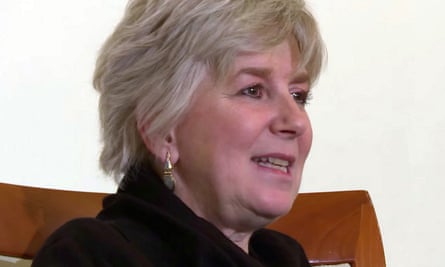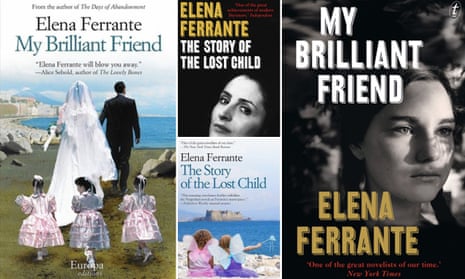It is, arguably, the biggest mystery in modern literature: the true identity of novelist Elena Ferrante. But when one of Italy’s investigative journalists claimed to have unmasked her on Sunday, the response of many in the literary world was to ask why he had felt the need to do so.
Writing for the New York Review of Books and Il Sole 24 Ore, journalist Claudio Gatti said he had been able to identify the author of My Brilliant Friend and the rest of the highly acclaimed Neapolitan series as a Rome-based translator who once helped run a publishing imprint of Italian writers.
But her publisher and high-profile authors asked why Gatti had acted the way he did. Sandro Ferri, Ferrante’s publisher and one of the few people who is known to know her identity, said he was appalled by the attempt to unmask a woman who has purposely steered clear of the limelight and has always said that she only wanted to write books.
“We just think that this kind of journalism is disgusting,” he told the Guardian. “Searching in the wallet of a writer who has just decided not to be ‘public’.”
Readers called the alleged scoop an intrusion into the life of one of the world’s most influential female writers. Some were afraid it would stop Ferrante from ever writing again, saying the story had been driven by the ego of the reporter and the New York Review of Books.
Some said there were far more worthy targets of investigative journalism.
Who else here would rather uncover Trump's taxes than Elena Ferrante's identity?
— Pamela Paul (@PamelaPaulNYT) October 2, 2016
Shameful. If Elena Ferrante doesn't write another book, it is because of the attention-hungry egos of Claudio Gatti & @nybooks editors.
— Kimberly Burns (@kimberlyburnspr) October 2, 2016
Jojo Moyes, the British author who wrote Me Before You, said the issue boiled down to something very simple: that Ferrante may have had good reason to write under a pseudonym.
Re those last RTs. Maybe Elena Ferrante has very good reasons to write under a pseudonym. It's not our 'right' to know her.
— Jojo Moyes (@jojomoyes) October 2, 2016
Gatti’s conclusion was based on his review of payments that were allegedly made by Ferrante’s publisher, Edizione E/O, which Gatti said showed that the main financial beneficiary of Ferrante’s extraordinary success was Anita Raja.
Raja’s name will be familiar to those who have long followed the speculation over Ferrante’s identity, as it has been raised in ruminative Italian press reports for years – never with any solid evidence.
In his piece, Gatti pointed to Italian real estate records that allegedly showed Raja and her husband, Domenico Starnone, buying multimillion euro properties in Rome around the time that Ferrante became an international sensation.
Gatti reported that neither Raja nor Starnone had responded to repeated requests for comment.
In response to the criticism, Gatti said Ferrante was arguably the most well-known Italian figure in the world, and that there was a “legitimate right for readers to know ... as they have made her such a superstar”.
He said Ferrante and her publishers acknowledged as much when they agreed to publish a autobiographical work called Frantumaglia, which Gatti said was “full of untruths” about Ferrante’s personal story.
In it, Ferrante points to a quote from Italo Calvino: “Ask me what you want to know, but I won’t tell you the truth, of that you can be sure,” saying she liked the passage.
“I believe that by announcing that she would lie on her own ‘autobiographical’ essay, Ferrante has in a way relinquished her right to disappear behind her books and let them live and grow while their author remained unknown,” Gatti told the Guardian in an email.
“Indeed, she and her publisher seemed not only to have fed public interest in her true identity but to have challenged critics and journalists to go behind the lies. She told us that she finds them ‘healthy’. As a journalist, I don’t. In fact it is my job to expose them.”
While dozens of articles have been written over the years speculating about Ferrante’s true identity, Ferrante has always zealously guarded her anonymity, saying it gives her the protection she needs to write in the sometimes brutally honest style that millions of people have been drawn to.

Readers – and critics – particularly admire Ferrante for her ability to capture the inner lives of women, a feat that the author has always suggested requires her to be shielded from public scrutiny.
Asked in an email interview for the Gentlewoman earlier this year why she protected her anonymity, Ferrante said it was partly to shield the Neapolitan community from which she drew her inspiration. But there were other reasons, too.
“The wish to remove oneself from all forms of social pressure or obligation. Not to feel tied down to what could become one’s public image. To concentrate exclusively and with complete freedom on writing and its strategies,” she wrote.
When asked in a 2015 email interview in the Financial Times about her characters’ emotional breakdowns, experiences that are described as “dissolving”, Ferrante said she had seen the phenomenon in her own mother.
“We experience too many ties that choke our desires and ambitions. The modern world subjects us to pressures that at times we are not able to bear,” she said.
In another passage, she explains the sometimes savage world she grew up in, where men could be violent to “correct” women.
In comments that could resonate in the media storm surrounding her identity, she wrote: “Today much has changed but I still think the men who can really be trusted are a minority … maybe (and this is what I tend to believe) it’s because male power, whether violently or delicately imposed, is still bent on subordinating us. Too many women are humiliated every day and not just on a symbolic level.”
According to Gatti, Raja has worked as a German translator for Edizione E/O and helped to run an imprint there, Collana degli Azzurri, in the 1990s, which published about four books by Italian writers, including Ferrante’s first novel. Among other works, Raja has translated the works of German writer Christa Wolf.
If Ferrante’s identity is ever confirmed – and it may never be – it would at least end speculation, particularly in the Italian press, that Ferrante is actually a man.
In an article by journalist Rachel Donadio published in the New York Review of Books in 2014, Donadio said the suggestion was “more telling about contemporary Italy than about Ferrante’s work”, before repeating the assertion that it could be Domenico Starnone, Raja’s husband, or Raja.










Comments (…)
Sign in or create your Guardian account to join the discussion